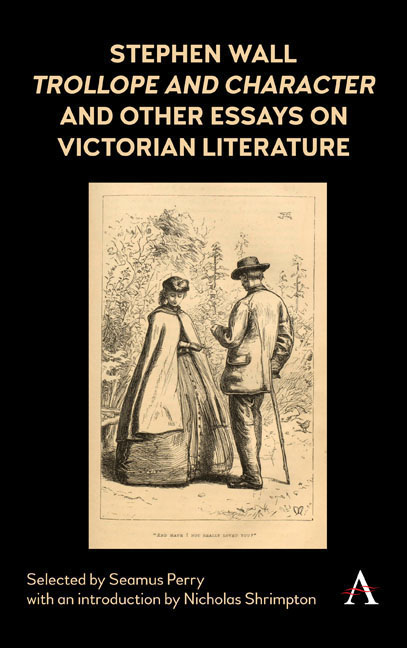Book contents
- Frontmatter
- Contents
- Preface
- Introduction: Stephen Wall and Trollope
- Part 1 On Trollope
- Part 2 On Dickens and Others
- 3 [George Eliot and Her Readers] [1965]
- 4 Jane Austen's Judgments [1968]
- 5 Dickens: New Words and Old Opinions [1969]
- 6 [Dickens and His Readers] [1970]
- 7 Dickens in 1970 [1971]
- 8 Annotated English Novels? [1982]
- 9 Affective Intentions [1985]
- 10 Virtuoso Variations [1987]
- 11 Going Beyond the Repertory [1990]
- 12 A Little Local Irritation [1998]
- Index
12 - A Little Local Irritation [1998]
from Part 2 - On Dickens and Others
Published online by Cambridge University Press: 25 July 2018
- Frontmatter
- Contents
- Preface
- Introduction: Stephen Wall and Trollope
- Part 1 On Trollope
- Part 2 On Dickens and Others
- 3 [George Eliot and Her Readers] [1965]
- 4 Jane Austen's Judgments [1968]
- 5 Dickens: New Words and Old Opinions [1969]
- 6 [Dickens and His Readers] [1970]
- 7 Dickens in 1970 [1971]
- 8 Annotated English Novels? [1982]
- 9 Affective Intentions [1985]
- 10 Virtuoso Variations [1987]
- 11 Going Beyond the Repertory [1990]
- 12 A Little Local Irritation [1998]
- Index
Summary
In October 1860 Dickens finally moved what remained of his family from Tavistock Square in Bloomsbury to Gad's Hill Place in Kent. He'd bought it four years earlier (for £1,750), steadily improved it, and it remained his home until he died there in 1870. On high ground between Rochester and Gravesend, it was the very spot, as his letters insist, where Falstaff ran away. For Dickens, though, the house had a more personal association: he'd admired it as a small boy living nearby, and had been told by his father that if he worked really hard he might one day be able to live there. Recounting this story earlier in the year in a piece written for his weekly, All the Year Round, Dickens had wisely declined to congratulate himself on the realization of his childish ambition. The household at Gad's Hill hardly matched the domestic idylls with which his novels so often conclude.
Dickens's wife wasn't part of it, for a start. Catherine had been pensioned off, following the messy separation of 1858, and was living near Regent's Park with their eldest son Charley. In a letter to Miss Burdett Coutts – a friend to both parties – Dickens unforgivingly vetoes the reconciliation she suggests: ‘That figure is out of my life for evermore (except to darken it), and my desire is, Never to see it again.’ This ban didn't apply to Charley, whose shaky City career Dickens tried to foster despite his disapproval of Charley's marriage to the daughter of his former publisher, with whom he'd now quarrelled. Dickens predicted disaster for the marriage – ‘It is sure not to answer’ – but according to one of the quietly corrective notes the Pilgrim Edition so usefully supplies, there is no evidence of unhappiness. The other child to marry at this time was Katie. Her choice of Wilkie Collins's younger brother was more acceptable, and Dickens presided genially enough over the pastoral festivities: ‘the people of the village strewed flowers in the churchyard, and erected triumphal arches, and fired guns.’ It was ‘a great success’, he conceded. ‘So far.’
- Type
- Chapter
- Information
- Publisher: Anthem PressPrint publication year: 2018



